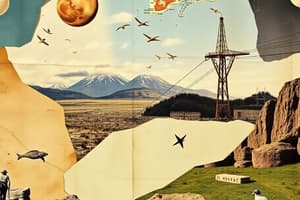Podcast
Questions and Answers
What does Human Geography primarily study?
What does Human Geography primarily study?
- Human activities and their impact on the environment (correct)
- Climate zones and vegetation patterns
- Physical characteristics of geographical locations
- Natural features and processes of the Earth
Which statement about maps is true?
Which statement about maps is true?
- GIS technology is unrelated to maps.
- They provide a visual representation of geographical areas. (correct)
- Maps are exclusively used for political purposes.
- They can only represent physical features of the Earth.
What is a characteristic of Physical Geography?
What is a characteristic of Physical Geography?
- Study of climate and ecosystems (correct)
- Examination of human population growth
- Analysis of cultural landscapes
- Research on economic trade patterns
Which of the following best defines 'absolute location'?
Which of the following best defines 'absolute location'?
What do 'climate zones' classify?
What do 'climate zones' classify?
What is one issue that falls under Environmental Geography?
What is one issue that falls under Environmental Geography?
What aspect does Political Geography study?
What aspect does Political Geography study?
Which of the following options is NOT a branch of Geography?
Which of the following options is NOT a branch of Geography?
Flashcards are hidden until you start studying
Study Notes
Social Studies: Geography
-
Definition: Geography is the study of the Earth’s landscapes, environments, and the relationships between people and their environments.
-
Branches of Geography:
- Physical Geography: Examines natural features and processes (climate, landforms, vegetation, and ecosystems).
- Human Geography: Studies human activities, cultures, and their impact on the environment (population, urban development, and cultural landscapes).
-
Key Concepts:
- Location:
- Absolute Location: Exact coordinates (latitude and longitude).
- Relative Location: Position in relation to other places.
- Place: Describes the physical and human characteristics that define a location.
- Region: Areas defined by shared characteristics (cultural, political, economic, physical).
- Movement: Way people, goods, and ideas travel from one place to another.
- Human-Environment Interaction: Examines how humans adapt to, modify, and depend on their environment.
- Location:
-
Tools of Geography:
- Maps: Visual representation of geographical areas, showing various features.
- Types: Physical maps, political maps, thematic maps.
- GIS (Geographic Information Systems): Technology used for mapping and analyzing spatial data.
- Remote Sensing: Acquiring data about the Earth from satellites or aircraft.
- Maps: Visual representation of geographical areas, showing various features.
-
World Geography:
- Continents: Seven major landmasses (Africa, Antarctica, Asia, Australia, Europe, North America, South America).
- Oceans: Major bodies of water (Atlantic, Pacific, Indian, Southern, Arctic).
- Climate Zones: Classifications based on temperature and precipitation patterns (tropical, temperate, polar, arid).
-
Cultural Geography:
- Examines how culture influences space and place (language, religion, ethnicity).
- Cultural landscapes: Physical and human-made features that reflect cultural practices.
-
Economic Geography:
- Focuses on the distribution of economic activities and resources.
- Examines industries, agriculture, trade, and globalization.
-
Political Geography:
- Studies spatial aspects of political behavior and the organization of political entities.
- Territoriality, borders, state sovereignty, and geopolitics are key concepts.
-
Environmental Geography:
- Investigates the interactions between people and the natural environment.
- Issues include sustainability, conservation, and climate change.
-
Major Geographic Theories:
- Central Place Theory: Explains the size and distribution of cities based on their economic functions.
- Spatial Interaction: Describes the flow of goods, people, and information between locations.
By understanding these concepts, students can better analyze the interconnectedness of geographical factors and their effects on human societies.
Geography Definition
- Geography is the study of the Earth's landscapes, environments, and the relationships between people and their environments.
Branches of Geography
- Physical Geography: Focuses on natural features and processes like climate, landforms, vegetation, and ecosystems.
- Human Geography: Studies human activities, cultures, and their impact on the environment, encompassing topics like population, urban development, and cultural landscapes.
Key Concepts in Geography
- Location:
- Absolute Location: Refers to precise coordinates using latitude and longitude.
- Relative Location: Describes a place's position in relation to other places.
- Place: Details the unique physical and human characteristics that define a location.
- Region: Areas defined by shared characteristics, such as cultural, political, economic, or physical.
- Movement: Examines the ways people, goods, and ideas travel from one place to another.
- Human-Environment Interaction: Investigates how humans adapt to, modify, and depend on their environment.
Tools of Geography
- Maps: Visual representations of geographical areas, showcasing features like physical landforms, political boundaries, or specific themes.
- Physical Maps: Display natural features like mountains, rivers, and elevation.
- Political Maps: Show country borders, state boundaries, and major cities.
- Thematic Maps: Highlight specific data like population density, climate patterns, or economic activity.
- GIS (Geographic Information Systems): A technology used for mapping and analyzing spatial data, allowing for complex spatial analysis and visualization.
- Remote Sensing: Acquiring data about the Earth from satellites or aircraft, providing information on land use, vegetation, and environmental changes.
World Geography
- Continents: Seven major landmasses: Africa, Antarctica, Asia, Australia, Europe, North America, and South America.
- Oceans: Major bodies of water: Atlantic, Pacific, Indian, Southern, and Arctic.
- Climate Zones: Classifications based on temperature and precipitation patterns, including tropical, temperate, polar, and arid zones.
Cultural Geography
- Examines how culture influences space and place, including language, religion, ethnicity, and cultural landscapes.
- Cultural Landscapes: Physical and human-made features reflecting cultural practices, like traditional architecture, agricultural patterns, or religious sites.
Economic Geography
- Focuses on the distribution of economic activities and resources.
- Examines industries, agriculture, trade, and globalization's impact on different regions.
Political Geography
- Studies the spatial aspects of political behavior and the organization of political entities.
- Key concepts include territoriality, borders, state sovereignty, and geopolitics.
Environmental Geography
- Investigates the interactions between people and the natural environment.
- Addresses issues related to sustainability, conservation, and climate change.
Major Geographic Theories
- Central Place Theory: Explains the size and distribution of cities based on their economic functions and the surrounding service areas they provide.
- Spatial Interaction: Describes the flow of goods, people, and information between locations, analyzing the factors influencing these movements.
Studying That Suits You
Use AI to generate personalized quizzes and flashcards to suit your learning preferences.




